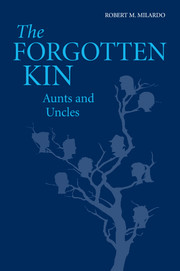Book contents
4 - Essential Aunting and Uncling
Published online by Cambridge University Press: 20 January 2010
Summary
Aunts and uncles viewed their roles in a variety of ways, some quite distinct, often seeing themselves as adjuncts to parents, as third parties with unique perspectives, or, in a surprising number of cases, as surrogate parents. Each of these roles is illustrated throughout the interviews. Aunts and uncles freely discussed how they viewed themselves and their relationships with favored nieces and nephews, and they just as importantly talked about their siblings. In turn, nieces and nephews shared their views of a favored aunt or uncle and the ways in which they were influential and, in many cases, continue to be so. The three primary roles of adjunct, third-party, and surrogate parent are not necessarily mutually exclusive. Relationships change over time, and perhaps one of the more important attributes of the ties linking family members is their resiliency, their long histories, and the expectation that relationships will continue well into the future. This expectation of continuity is consistent in many of the interviews and represents an important context for the relationships that develop. I consider each of these issues in the pages that follow, considering first how aunts and uncles viewed the importance of their relationships in general terms and how such relationships change over time. I then consider how aunts and uncles supplement parents, acting as objective third parties or surrogate parents, often when biological parents are unavailable or entirely absent.
- Type
- Chapter
- Information
- The Forgotten KinAunts and Uncles, pp. 70 - 100Publisher: Cambridge University PressPrint publication year: 2009



